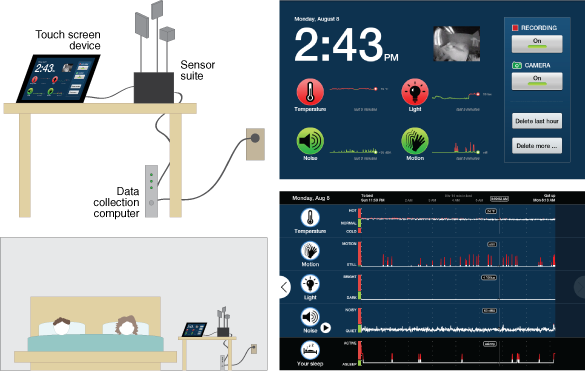A Know-it-all Sleep Tracker
Sleep tracking is in vogue. You can buy gadgets shaped like headsets, bracelets, and thumb drives (like the Zeo, Basis, or Fitbit) even under-mattress sensor pads that will track a whole constellation of sleep indicators—body temperature, movement, electrical activity in your brain—as you slumber.

The Lullaby, a prototype tracker built at the University of Washington goes one step further. It doesn’t just show when you weren’t resting well, it helps you understand why your Zs were thrown off. It tracks your sleeping environment, picking up things like room temperature, ambient light intensity, background noise—and matches those up with biological sleep signs mapped by the wrist-worn Fitbit. An IR camera takes a photograph of the sleeping subjects every 15 seconds, adding a staggered video log to sleep data being collected. Over a morning cup of coffee, on a tablet app, a user can flick through data gathered the previous night.
Four randomly recruited people tested the Lullaby for about two weeks, setting it up on bedside tables in their rooms. The designers of the device thought hard about privacy concerns when they designed the setup. The testers could review and delete sections of footage that they didn’t want seen, or private conversations they didn’t want heard. They could also turn the device off if they didn’t want to be recorded at any time.
The testers each collected a little more than a dozen sleep samples. One user discovered the frequency of his snoring habit and another saw how often she turned over in her sleep. In a third instance, one user was able to pin down the moments during his sleep cycle when he started sleepwalking.
While some testers deleted sections of the recording that involved pre-sleep conversations or other intimate moments, none of them erased any data collected while they were unconscious and asleep. It’s true, this group is probably more eager than most to log unconscious moments of their life—that’s why they signed up for the study. Still, I was a tiny bit surprised by how comfortable the Lullaby testers were with programming gadgets to watch them sleep (even though the data was only available to the researchers who recruited them).
I hadn’t considered the intrusiveness of the Fitbit or Zeo before (after all, those devices just gather biological data), but the Lullaby’s comprehensive tracking ability makes me wonder how comfortable we’ll be about sharing, publicly or otherwise, patterns in our unconscious behavior as this kind of technology gets ever-more advanced.
Keep Reading
Most Popular
Large language models can do jaw-dropping things. But nobody knows exactly why.
And that's a problem. Figuring it out is one of the biggest scientific puzzles of our time and a crucial step towards controlling more powerful future models.
How scientists traced a mysterious covid case back to six toilets
When wastewater surveillance turns into a hunt for a single infected individual, the ethics get tricky.
The problem with plug-in hybrids? Their drivers.
Plug-in hybrids are often sold as a transition to EVs, but new data from Europe shows we’re still underestimating the emissions they produce.
Stay connected
Get the latest updates from
MIT Technology Review
Discover special offers, top stories, upcoming events, and more.